- Home
- Jimmy Guieu
Polarian-Denebian War 6: Prisoners of the Past
Polarian-Denebian War 6: Prisoners of the Past Read online
The Polarian-Denebian War
(Volume 6)
Prisoners of the Past
by
Jimmy Guieu
translated by
Michael Shreve
A Black Coat Press Book
PRISONERS OF THE PAST
CHAPTER ONE
The B47 quadjet ionocruiser that was carrying the International Research Commission appointed by the GCSR 1 had taken off from Tokyo at 10:30 am local time for Nagasaki.
Because August 9, 1961, was exactly 16 years after the destruction of Nagasaki by the second American bomb, the UN and the GCSR were sending out a multi-national team of researchers. For 15 days they would carry out a systematic study of the city and its surroundings, its natural resources and its population, which would result in, like every year, a census of the survivors affected by the radiation and a meticulous examination of their bodies in order to detect any possible cellular degeneration.
These specialized researchers were going to devote themselves to the study of humans (on the physiological, psychological and cultural level), animals, plants, raw materials and the soil formerly submitted to radiation.
On board the ionocruiser and under the leadership of Professor Saigo Kato, a world famous Japanese teratologist, were sitting Dr. Jean Kariven, anthropologist; Michel Dormoy, geophysicist; Robert Angelvin, an ethnographer representing French Science; Professor Red Harrington, mathematician and chair of applied physics at the California Institute of Technology; and Kurt Streiler, physicist and electronics expert representing the USA.
The Russian delegation was made up of Professors Serge Yegov, atomic physicist and head of the facilities in Atomgrad, and Colonel Zavkom, biologist and ex-colonel of the Soviet Air Force.
England had sent John Shelley, a specialist in cosmic rays; Italy, Dr. Renato Tagliero, nutritional biologist; Brazil, Ricardo Alves, Nobel Prize winner in chemistry.
In a world finally united, thanks to the generous intervention of the Polarians, the Men from Outer Space who came from the solar system of the Pole Star, these international specialists were going to cooperate in a peaceful goal to improve the lot of the Japanese survivors.
Sitting comfortably in their plastex seats, the scientific delegates were chatting amiably. Zavkom, in plain clothes, his blond hair cut short, offered a long cigarette with a gold filter to his friend Kariven, sitting on his right. While pulling the cigarette out he followed the eyes of his neighbor that were staring out the window at the sky, which was rapidly turning gray.
“I have the feeling that the summer monsoon is preparing a nasty day for us,” Zavkom mumbled in English.
“That’s weird,” the anthropologist responded. “The sky is turning gray, but there’s no clouds in sight.”
This observation caught the attention of Dormoy and Shelley, sitting behind them.
“Maybe a mass of volcanic dust is blocking the sun at a high altitude?” the geophysicist wondered.
“This is nothing compared with the darkness of our London fog,” the Englishman smiled. “In the streets you can’t see anything. Anyway, we’re landing in… Look at that, my watch stopped! What time do you have, Dormoy?”
He slid up the double cuff of his shirt to look at his watch and smiled back, “Bad luck, Shelley, my watch has stopped too. You have the time, Kariven?” he leaned forward.
“Sure,” the Frenchman turned around. “It’s… Damn, my watch stopped at 10:30, the time we took off.”
“Get this! My watch is also stopped at 10:30!” Zavkom was puzzled.
In the double row to their left the delegates looked at their watches and then at each other in surprise.
“Santa Madonna!” Tagliero exclaimed comically, speaking in English but rolling his Rs, “It’s a trick! Out watches all stopped working at 10:30!”
Indeed, he spoke the truth. The delegates’ watches were all showing 10:30.
Kariven stood up, went to knock at the cockpit door and asked the stewardess, “Can you tell me the time, Miss Robson?”
“Of course, Dr. Kariven,” she raised his wrist. “Oh, I’m sorry. I’ll have to ask the pilot because…”
“I think there’s no need. His watch and the instrument panel probably stopped on takeoff. Could you check?”
A minute later the charming stewardess came back a little pale. “I don’t understand it at all. The clocks and watches all stopped at 10:30.”
“Where are we right now.”
“We’re flying over Usuki Kyushu. Landing in ten minutes in Nagasaki.”
Kariven went back to his seat pensively. He turned around and asked, “Mike, what do you think of all our watches suddenly stopping at the same time on board the plane?”
“Our watches reacted as if they’d been put near a powerful source of magnetic energy. And yet that’s not the case. Even if we were flying over a mountain of magnetite, at our altitude this shouldn’t have happened. I can’t see any… rational cause for the sudden freeze.”
Kariven went back to the cockpit to listen to the radioman communicate with the Nagasaki airport.
“ZHIB3, special ionocruiser from the GCSR, Tokyo Division, calling Nagasaki…”
A lilting voice in Japanese came out of the speaker but the radioman, who did not understand the language, just repeated his call in English. In the cabin the passengers were starting to get nervous. Dr. Saigo Kato stood up, adjusted his glasses and slipped into the cockpit. “Allow me,” he bowed to the operator who gave him the microphone.
He repeated the call in Japanese and added, “On board this airplane are American, French, English, Russian, Italian and Brazilian experts. Why didn’t you answer in English? We want to land. Can you tell us what runway…”
The speaker echoed with a flood of words in Japanese, then angry, shrill shouting.
Saigo Kato opened his eyes wide and stared at the speaker. Then, losing his usual aloofness he bent over the pilot and spit out, “Captain Howard, change course and gain altitude immediately!”
“But I can’t…”
“I beg you, Captain. Our safety is at stake!”
Seeing his frightened attitude the pilot understood that the unusual order must have serious reasons behind it. He veered off course, headed east and pushed his four jets to bring them almost vertical in a deafening whine.
Above the plane small white clouds suddenly appeared, breaking up abruptly to dissipate in the air.
“But… they’re firing at us!” Kariven was alarmed. “Look at those anti-aircraft shells exploding under our plane!”
All of a sudden a bright light, infinitely brighter than the sun, lit up the misty sky five miles below them. A blinding, terrifying ball of light with ringed turbulence at the base, filled the southwest horizon off Kyushu. The orb of fire swelled up and spread out over a giant, pink-orange-purple corolla, rising up at dizzying speed to form a dome at the top, flashing with lightning.
All the passengers of the ionocruiser had instinctively closed their eyes or turned their heads.
Professor Yegov, with his hand over his eyes, in a strangled voice stammered, “It’s unbelievable… an atomic bomb… just exploded in Nagasaki!”
Trying to control his trembling hand Dr. Kato brought the microphone up and repeated his calls, but in vain: the speakers remained stubbornly mute. The Japanese put the mic down gently and staggered back to the cabin where everyone was waiting anxiously for news.
“Nagasaki isn’t answering…”
“That’s weird,” Kariven thought aloud. Then, “You look troubled, Dr. Kato, when you were talking with the control tower. Could I ask why?”
“Of course, Dr. Kariven.
The control tower didn’t understand English, which surprised me. When I explained to him that our plane, with international scientists on board, wanted to land, the operator started cursing me… and set off the anti-aircraft alarm that immediately tried to shoot down our plane.”
“Are you sure that the order was given?” Zavkom frowned, finding it hard to believe.
“Should I remind my esteemed Russian colleague that I know my ancestral language perfectly well?”
Dormoy was fumbling open a leather case. He pulled out a scintillation counter and quickly turned it on. On the head of the machine, shaped like a huge pistol, a red light started blinking fast.
The geophysicist shouted, “Captain Howard, climb immediately to maximum altitude! We’re in the middle of a radioactive zone!”
Without waiting for further explanations the pilot opened up the jets and shouted back, “Hold on!”
Standing in the middle of the cabin Dormoy did not have time to get back to his seat and lost his balance, falling against Dr. Alvez. The Brazilian chemist held him fast while the quadjets reached full speed, climbing vertically at 1,700 mph.
In record time it reached 40 miles altitude and in the ionosphere reduced its speed as it leveled off. Dormoy straightened up, grimaced and after making sure that his scintillator had survived his fall, he went back to his seat.
“Ah, we barely made it. Despite the anti-radiation protection in the cabin, the rays from the explosion got through the walls a little. Thank God the intensity of the radiation was dampened and too weak for us to have to worry about it. But that was a close one!”
“For God’s sake,” Tagliero thundered, “what happened? Is it really an atomic bomb? My eyes hurt and I swear I can still see that blinding mushroom cloud!”
“A strange coincidence,” Kariven rubbed his eyes gently. “August 9, 1945, at 11:01 hours an atomic bomb exploded in Nagasaki. Today, August 9, 1961, sixteen years later, and around the same time, another atomic bomb explodes in the same city. The world, however, is not at war as far as I know.”
“Enough to drive you nuts,” Angelvin grumbled. “All the atomic and thermo-nuclear bombs on Earth have been confiscated by our friends the Polarians. So, no country could have launched one on Nagasaki. And even if one could, what would be the point, by God?”
“Note also that no laboratory working on nuclear weapons exists in Nagasaki,” Kato reminded them. “A hypothetical accident is out of the question.”
“And yet someone had to launch the damned bomb that blew up Nagasaki,” Yegov the atomic physicist growled.
“Plus, why did the control tower in Nagasaki order the anti-aircraft missiles to shoot us down when all the nations of Earth are united now?”
Kato, obviously disturbed by this attack made over his country, sighed, “My poor mind can’t explain this act of wicked violence against your honorable selves. I’m sorry, truly sorry, and I’ll report it to the Ministry as soon as we arrive. I’ll demand the responsible parties be punished.”
“Don’t worry, Kato,” Professor Harrington consoled. “I can’t explain this strange incident any more than you but you have no reason to doubt the friendship that unites the peoples of Earth today. I refuse to believe that it was a clear-cut attack. I propose we turn back to Tokyo where we can get some useful information.”
“I don’t see any other solution, given that our research program was just canceled by the destruction of Nagasaki.”
Obeying Kaito’s orders, the pilot set course for Tokyo. The plane started descending toward the East and came out of the ionosphere. The jets, after being quiet in the relative void at 100 miles altitude, started whistling. Then they howled and ended up wailing loudly, deafeningly in the lower atmosphere. All of a sudden the radioman furrowed his brow while scrutinizing the fluorescent radar. Six bright dots—radar blips or echoes—appeared, getting bigger and bigger at every swing of the line around the screen.
“According to the size of the blips,” the operator told the chief pilot, “they’re fighters. The idiots are heading straight at us at 300 mph! So they must not have radar to tell them that we’re flying head on to meet them!”
“Nah! New recruits probably,” Captain Howard said untroubled. “They’re still 100 miles away and it won’t be long before they spot us. Then they’ll change course. But I’ll still gain a little altitude… just to keep them from getting balled out by their instructors.”
The maneuver was handled expertly and the ionocruiser went up from three to four miles altitude. The blips representing the six fighters disappeared from the radar but seven minutes later they reappeared on the edge of the screen, even bigger this time. Keeping his eye glued to the telescope, the co-pilot soon spotted the planes that he kept in the crosshairs of the scope.
“Captain! They’re heading straight at us, literally!” the radioman announced.
The co-pilot was almost crushing his eye against the scope and swearing, “Damn! On the side of the planes I see the emblem of… the Mikado! The Emperor of Japan!”
“You’re crazy! The Mikado in 1961! You’re seeing things…”
A hail of machine gun bullets suddenly cracked against the plane’s armor and one of them flew through the cockpit’s Plexiglas but it did not hit any of the occupants.
“Get your masks on!” Howard ordered, making the plane climb at maximum speed into the ionosphere.
He put his oxygen mask over his nose, imitated by his men, while he activated the airtight closure separating the cockpit from the passenger compartment. The others were now isolated from the cabin that was losing pressure.
The quadjet was now at 85 miles altitude after easily losing the Japanese fighters. The radioman hurried to seal the bullet hole by applying a patch of Plexiglas with a machine that looked a little like an electric sander.
Then, turning the interior speakers on Captain Howard spoke to the passengers. “Gentlemen, although the incident did not last long, you must have realized that a bullet penetrated our cockpit… without hurting anyone. A quick repair has been made, bringing the pressure pretty much back to normal. However, just as a precaution we’ll leave the safety hatch closed. Miss Robson, is everything okay?”
“We’re a little shaken up but everyone’s fine, Captain. Professor Harrington wants to talk to you.”
The mathematician stepped up to the wall speaker. “Captain Howard. I just had a brief talk with Dr. Kato. Though we can’t explain these… alarming incidents, we’ve decided not to head back to Tokyo but to get to the closest American base. Where is it?”
“I don’t get it, Professor. What do you mean by the closest American base? In Japan?”
“No, in the Pacific is better. At Okinawa for example…”
“In the Pac… But Professor, we don’t have enough fuel even to reach Formosa!2 We’ve already used up three quarters of our reserves with these maneuvers, climbing up at full speed. All we can do is to drop down and glide to Tokyo. And still, I’m not sure we have enough fuel to reach the city. Coming from Rangoon we made the stopover in Tokyo only to pick up Dr. Kato without thinking that we needed to refuel. We had enough reserves to reach Nagasaki but with all this trouble in the air…”
“Captain!” the radioman cried out as he turned up the volume on the radio. “Listen to this!”
…spreading out for almost two square miles. We are recording almost 40,000 dead and 25,000 wounded. The destruction caused by the atomic bomb Fat Boy, although quite considerable, is not as extensive as that caused by the atomic bomb Little Boy that destroyed Hiroshima three days ago. The wounded amounted to…
The broadcast in English was suddenly interrupted and only crackling was heard over the speakers.
Captain Howard’s voice spoke out worriedly, “Make up your mind, Professor. Our fuel is running out and I have to cut down to two jets to stay this high for a few more minutes.
“How long can you hold this altitude, Captain?”
“Five minutes, maybe ten, but I don’t belie
ve in Santa Claus anymore, you know… I have to choose a heading so we can land on relatively flat land without too much damage.”
“Captain! A typhoon just came out of the north, heading straight for us!” the radar man alerted.
The chief pilot manipulated his controls and the plane veered away, gaining more altitude.
“I have to go back to the south or southwest, Professor. To avoid the typhoon I’ll have to get higher. Now, with the state of our reserves, we can’t climb very high or very fast or fight against the storm. Our only hope is to land before the typhoon can hit us. So, heading southwest.”
“But we’re going to be in the middle of the radioactive zone!”
“Would you rather crash into Mount Eshira on our left or go for a dip in Iyo Nada to our right? I’ll try to stay as far as possible from the hot zone but I can’t guarantee anything… Miss Robson, would you please hand out the anti-radiation suits immediately… Quickly! And say a prayer, if you have time.”
Hastily the stewardess with the help of some of the passengers distributed the big plastic bags containing the protective suits. In record time everyone was wearing their lightweight suits, checking the seals and fastening their seatbelts.
“Our compass is going crazy,” Captain Howard announced over the speaker. “Now we don’t know our exact heading. Visibility is really bad. Everything’s gray… but, the sun was shining in a cloudless sky. This is some unexplained phenomenon. Hold on!”
A violent shock and the passengers clenched the armrests of their seats. The plane had just landed hard and was still bumping along the rocky ground. Then it came to a halt.
Streiler smiled at Miss Robson through his soft, transparent helmet and asked, “Anything broken?”
“No. And you?”
“Not this time.”
One by one they left the plane and stood dazed. A mile to the west were the ruins of Nagasaki: the ground devastated, cluttered with twisted beams, with black, shapeless bulks of melted metal along the ravaged streets, the wreckage of all kinds of cars.

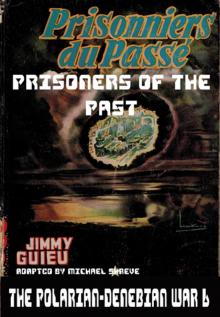 Polarian-Denebian War 6: Prisoners of the Past
Polarian-Denebian War 6: Prisoners of the Past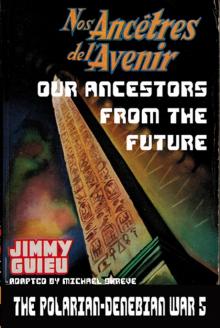 Polarian-Denebian War 5: Our Ancestors From the Future
Polarian-Denebian War 5: Our Ancestors From the Future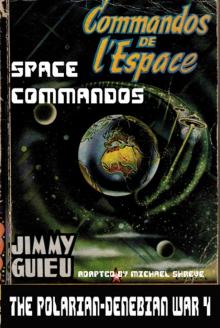 Polarian-Denebian War 4: Space Commandos
Polarian-Denebian War 4: Space Commandos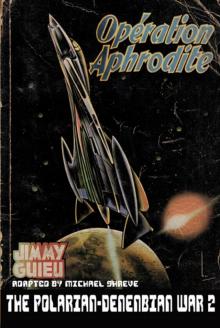 Polarian-Denebian War 2: Operation Aphrodite
Polarian-Denebian War 2: Operation Aphrodite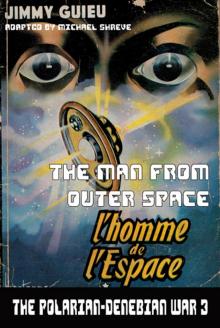 Polarian-Denebian War 3: The Man From Outer Space
Polarian-Denebian War 3: The Man From Outer Space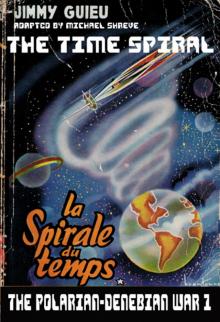 Polarian-Denebian War 1: The Time Spiral
Polarian-Denebian War 1: The Time Spiral